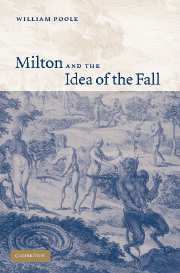Book contents
- Frontmatter
- Contents
- Acknowledgements
- Note on the text
- List of abbreviations
- Introduction
- Part I Fallen culture
- Part II Milton
- 7 Towards Paradise Lost
- 8 Paradise Losti: the causality of primal wickedness
- 9 Paradise Lostii: God, Eden and man
- 10 Paradise Lostiii: creation and education
- 11 Paradise Lostiv: Fall and expulsion
- Conclusion
- Notes
- Index
11 - Paradise Lostiv: Fall and expulsion
Published online by Cambridge University Press: 10 December 2009
- Frontmatter
- Contents
- Acknowledgements
- Note on the text
- List of abbreviations
- Introduction
- Part I Fallen culture
- Part II Milton
- 7 Towards Paradise Lost
- 8 Paradise Losti: the causality of primal wickedness
- 9 Paradise Lostii: God, Eden and man
- 10 Paradise Lostiii: creation and education
- 11 Paradise Lostiv: Fall and expulsion
- Conclusion
- Notes
- Index
Summary
The Cosmos itself feels the Fall, but we now backtrack and return to its human counterparts. The possibility of a fall is well prepared by the beginning of Book 9, and when it does take place the heavens alter too. It is also noteworthy that nature feels the Fall twice, once for each sex. Milton therefore treats both the feminine and the masculine falls as equally damaging, despite God's habit of talking solely about ‘man’. Henry Vaughan has been cited as accepting the ‘cosmic crack’ theory of the Fall, but he too imagined it as a masculine-driven cataclysm: ‘He drew the Curse upon the world, and Crakt / The whole frame with his fall’, echoing the commentators' typological feel that Adam's sin was the more important of the two.
Adam and Eve are carefully inoculated with the formula ‘yet sinless’ before this event; the narratorial voice protests as it must that evil has not yet entered in. Adam is ‘yet sinless’ at 7.61, before the narration of creation and the astronomy discussion, whereas Eve last receives this tag at 9.659, as she opens her mouth to reply to the serpent's question about whether and why the tree is forbidden. This sinlessness is voiced very late indeed in Eve's case, as if to reaffirm, against the narrative movement, that sin is only, mysteriously present at and with the actual taking itself.
- Type
- Chapter
- Information
- Milton and the Idea of the Fall , pp. 182 - 194Publisher: Cambridge University PressPrint publication year: 2005

